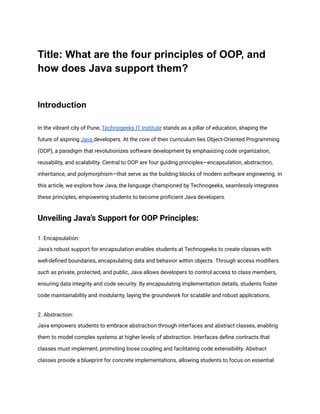Title_ What are the four principles of OOP, and how does Java support them.pdf
As Technogeeks IT Institute continues to nurture the next generation of Java developers, the fusion of OOP principles and Java's robust support drives innovation and excellence in Pune's tech ecosystem. Armed with a deep understanding of encapsulation, abstraction, inheritance, and polymorphism, students emerge as skilled problem solvers, ready to tackle real-world challenges and drive technological advancements. With Java as their tool of choice, learners at Technogeeks embark on a transformative journey, honing their skills and shaping the future of software engineering in Pune and beyond. As they navigate the ever-changing landscape of technology, their mastery of OOP principles and Java's capabilities ensures they remain at the forefront of innovation, driving progress and prosperity in Pune's thriving tech community.

Recommended
Recommended
More Related Content
Similar to Title_ What are the four principles of OOP, and how does Java support them.pdf
Similar to Title_ What are the four principles of OOP, and how does Java support them.pdf (20)
More from ishansharma200107
More from ishansharma200107 (12)
Recently uploaded
Recently uploaded (20)
Title_ What are the four principles of OOP, and how does Java support them.pdf
- 1. Title: What are the four principles of OOP, and how does Java support them? Introduction In the vibrant city of Pune, Technogeeks IT Institute stands as a pillar of education, shaping the future of aspiring Java developers. At the core of their curriculum lies Object-Oriented Programming (OOP), a paradigm that revolutionizes software development by emphasizing code organization, reusability, and scalability. Central to OOP are four guiding principles—encapsulation, abstraction, inheritance, and polymorphism—that serve as the building blocks of modern software engineering. In this article, we explore how Java, the language championed by Technogeeks, seamlessly integrates these principles, empowering students to become proficient Java developers. Unveiling Java's Support for OOP Principles: 1. Encapsulation: Java's robust support for encapsulation enables students at Technogeeks to create classes with well-defined boundaries, encapsulating data and behavior within objects. Through access modifiers such as private, protected, and public, Java allows developers to control access to class members, ensuring data integrity and code security. By encapsulating implementation details, students foster code maintainability and modularity, laying the groundwork for scalable and robust applications. 2. Abstraction: Java empowers students to embrace abstraction through interfaces and abstract classes, enabling them to model complex systems at higher levels of abstraction. Interfaces define contracts that classes must implement, promoting loose coupling and facilitating code extensibility. Abstract classes provide a blueprint for concrete implementations, allowing students to focus on essential
- 2. behaviors while hiding implementation details. By leveraging abstraction, Technogeeks' students create flexible and adaptable software components, capable of meeting evolving requirements. 3. Inheritance: Inheritance, a fundamental concept in Java, enables students to create class hierarchies, promoting code reuse and organization. Through class extension, subclasses inherit properties and behaviors from their parent classes, facilitating code scalability and maintenance. By leveraging inheritance, students at Technogeeks streamline code development, reduce redundancy, and establish clear relationships between classes, enhancing code readability and comprehension. 4. Polymorphism: Java's support for polymorphism enables students to write code that exhibits versatile behavior based on object types. Method overriding allows subclasses to provide specialized implementations of methods defined in their superclass, promoting code flexibility and extensibility. Method overloading simplifies API design by allowing multiple methods with the same name but different parameter lists, enhancing code readability and expressiveness. Through polymorphism, Technogeeks' students craft adaptable and resilient software solutions, capable of addressing diverse use cases. Empowering Students for Success: As Technogeeks IT Institute continues to nurture the next generation of Java developers, the fusion of OOP principles and Java's robust support drives innovation and excellence in Pune's tech ecosystem. Armed with a deep understanding of encapsulation, abstraction, inheritance, and polymorphism, students emerge as skilled problem solvers, ready to tackle real-world challenges and drive technological advancements. With Java as their tool of choice, learners at Technogeeks embark on a transformative journey, honing their skills and shaping the future of software engineering in Pune and beyond. As they navigate the ever-changing landscape of technology, their mastery of OOP principles and Java's capabilities ensures they remain at the forefront of innovation, driving progress and prosperity in Pune's thriving tech community.